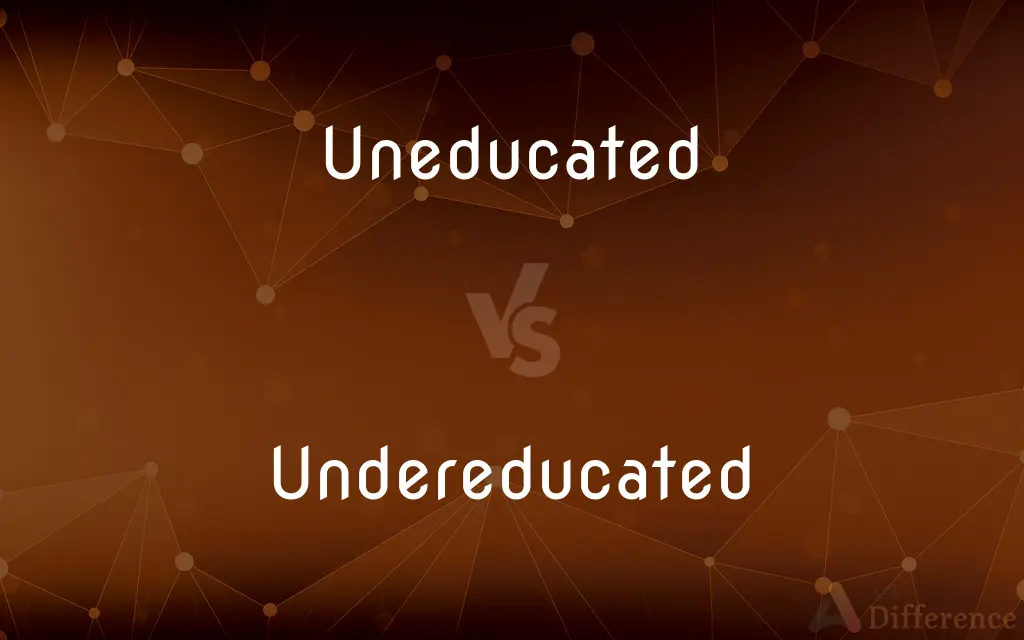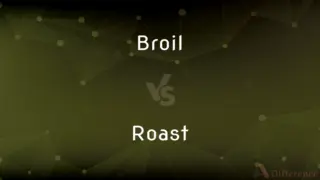Uneducated vs. Undereducated — What's the Difference?
Edited by Tayyaba Rehman — By Urooj Arif — Updated on April 23, 2024
Uneducated refers to a lack of basic education, while undereducated indicates insufficient education relative to societal or contextual standards.

Difference Between Uneducated and Undereducated
Table of Contents
ADVERTISEMENT
Key Differences
Uneducated often implies a complete or significant lack of formal schooling, making it hard for individuals to acquire basic literacy or numeracy skills. Undereducated, on the other hand, suggests that a person has received some formal education but it falls short of what is typically expected in their environment or job market.
Uneducated individuals might have had no access to schooling due to various barriers such as socioeconomic status or geographic location. Undereducated individuals, whereas, may have attended school but the quality or extent of education was inadequate.
Uneducated can also reflect a general absence of exposure to basic educational content like reading, writing, and simple arithmetic. Undereducated suggests that while the person may know basic reading and writing, their knowledge is not comprehensive enough to meet certain standards.
In many contexts, uneducated is used to describe older generations in regions where access to education was historically limited. Undereducated is more often applied to younger individuals or in contexts where educational reforms have not yet met their intended goals.
The term uneducated sometimes carries a more negative connotation, implying a lack of both formal education and self-learned knowledge. Undereducated, while still critical, often acknowledges external factors like inadequate educational systems.
ADVERTISEMENT
Comparison Chart
Basic Literacy
Often lacks basic skills like reading and writing
Has basic skills but below societal standards
Schooling
Little to no formal schooling
Some formal schooling, but insufficient
Societal Context
More common in historically less accessible regions
Common where education quality is lacking
Connotation
Generally more negative
Less negative, implies potential to improve
Age Association
Often associated with older generations
More associated with younger populations
Compare with Definitions
Uneducated
Having no basic literacy skills.
Uneducated in the modern world, he could neither read nor write.
Undereducated
Having less education than expected.
They were considered undereducated for professional work in their field.
Uneducated
Not having been exposed to cultural learning.
Uneducated about world religions, she was curious and asked many questions.
Undereducated
Educated but not to the full potential.
Despite being bright, he was undereducated due to lack of resources.
Uneducated
Unfamiliar with basic knowledge expected by society.
He was uneducated about basic computer use.
Undereducated
Inadequately educated relative to societal norms.
Undereducated, he struggled to compete in the job market.
Uneducated
Naive due to lack of education.
His uneducated opinions on science were based on misconceptions.
Undereducated
Having incomplete knowledge on specific subjects.
She was undereducated in mathematics, which hindered her career.
Uneducated
Lacking formal schooling.
She grew up in a rural area and remained uneducated.
Undereducated
Receiving an education of poor quality.
The undereducated students were not ready for college.
Uneducated
Not educated.
Undereducated
Poorly or insufficiently educated.
Uneducated
Not educated
Undereducated
Insufficiently educated.
Uneducated
Not having a good education
Undereducated
Simple past tense and past participle of undereducate
Uneducated
Not adequately educated in the use of numerical terms and concepts
Undereducated
Poorly or insufficiently educated
Common Curiosities
How does undereducation affect employment prospects?
It often limits job opportunities and earning potential, as undereducated individuals may not meet the required qualifications.
Is being uneducated the same as being illiterate?
Not exactly; being uneducated often includes illiteracy, but it also implies a broader lack of formal education.
What defines someone as uneducated?
Someone who has received little to no formal education and lacks basic literacy skills.
Can undereducated individuals successfully complete higher education?
Yes, with the proper support and resources, they can achieve higher educational levels.
Are there more undereducated people now than in the past?
It varies by region, but generally, access to education has improved, though many are still undereducated relative to new educational standards.
How do uneducated individuals perceive the need for education?
Perceptions vary, but many recognize the importance of education in improving life opportunities.
What impact does being uneducated have on personal development?
It can limit understanding of cultural, social, and technological advancements.
Can undereducated individuals improve their educational status?
Yes, undereducated individuals can improve their education through additional schooling and training.
Does uneducation equate to lack of intelligence?
No, uneducation relates to educational opportunities, not intrinsic intelligence.
What societal factors contribute to undereducation?
Economic disparities, inadequate schooling facilities, and insufficient governmental support.
Is undereducation a problem in developed countries?
Yes, even in developed countries, disparities in educational quality and access can lead to undereducation.
Are rural areas more likely to have uneducated individuals?
Historically, yes, due to less access to schools, though this is changing.
What are the long-term effects of undereducation on a community?
It can lead to a cycle of poverty and limited social mobility.
Share Your Discovery

Previous Comparison
Yoke vs. Yolk
Next Comparison
Broil vs. RoastAuthor Spotlight
Written by
Urooj ArifUrooj is a skilled content writer at Ask Difference, known for her exceptional ability to simplify complex topics into engaging and informative content. With a passion for research and a flair for clear, concise writing, she consistently delivers articles that resonate with our diverse audience.
Edited by
Tayyaba RehmanTayyaba Rehman is a distinguished writer, currently serving as a primary contributor to askdifference.com. As a researcher in semantics and etymology, Tayyaba's passion for the complexity of languages and their distinctions has found a perfect home on the platform. Tayyaba delves into the intricacies of language, distinguishing between commonly confused words and phrases, thereby providing clarity for readers worldwide.














































